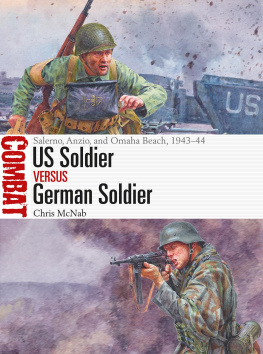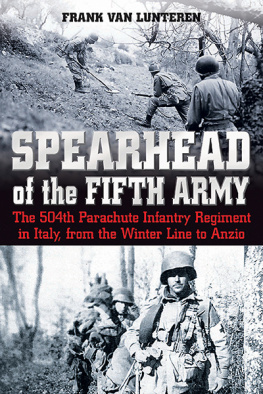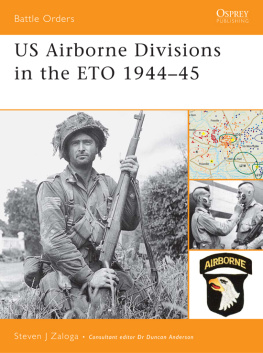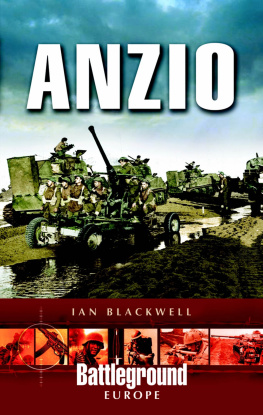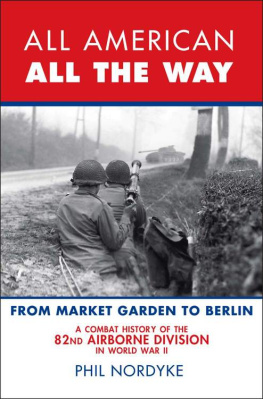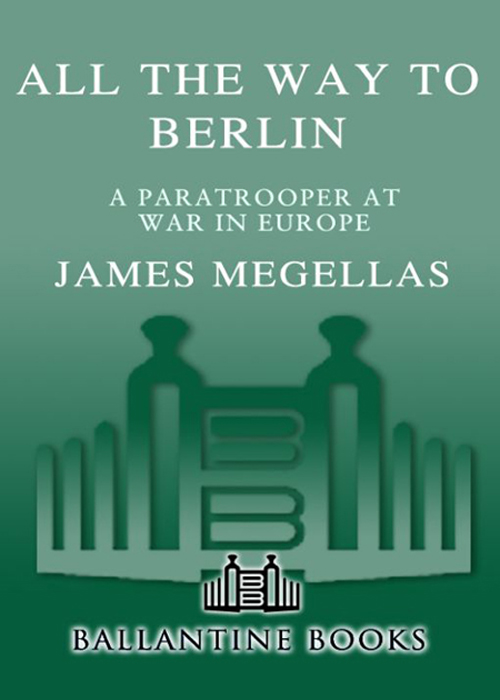
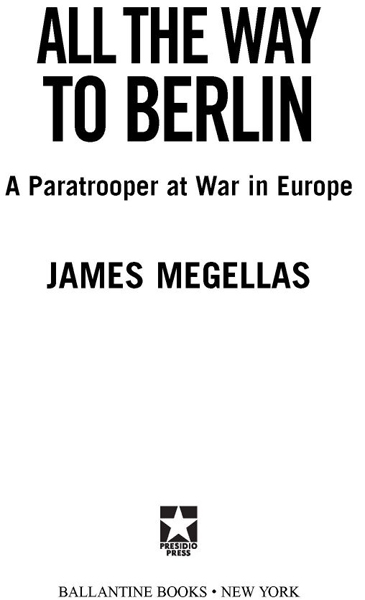
Table of Contents
Award of the Silver Star Medal, 19 March 1945
James Megellas, First Lieutenant, 504th Parachute Infantry. For gallantry in action on 28 January 1945 near Herresbach, Belgium. After breaking a trail across country for twelve hours in deep, dry snow, First Lieutenant Megellas, a platoon leader, was ordered to advance with his platoon and two supporting tanks along the main road leading into Herresbach. About one mile from the town, his platoon was fired upon by about 200 Germans forming for a defense. Quickly grasping the situation, he led a frontal assault on the startled enemy who attempted to fight back. First lieutenant Megellass direction and leadership of his men was so superb that within ten minutes the entire force of enemy was either killed, captured, or fled into the town. He then reorganized his platoon and, with the two supporting tanks, followed the enemy into the town. Braving heavy enemy sniper and rifle fire, he personally took a leading part in flushing the enemy out of their houses, killing eight and capturing five enemy. As a result of the First Lieutenants fearless leadership and skillful handling of his men, over 100 enemy were killed, 180 captured, and large amounts of valuable equipment fell into our hands. This feat was accomplished without the loss of a single man wounded or killed. First Lieutenant Megellas demonstrated a remarkable degree of tactical skill and a brand of courageous leadership which reflects highly upon himself and the Airborne Forces. Entered military service from Fond du Lac, Wisconsin.
signed James M. Gavin,
Major General,
U.S. Army, Commanding
Books published by The Random House Publishing Group are available at quantity discounts on bulk purchases for premium, educational, fund-raising, and special sales use. For details, please call 1-800-733-3000.
To Carole and our two sons, James and Stephen
This book is also dedicated to the memory of my buddy 1st Lt. Richard G. LaRiviereor Rivers, as we called him whose World War II experience was a mirror image of my own. We first met in 1943 at Fort Benning, Georgia, where we went through parachute school together. From that point on, we were with each other, from Africa to Italy and through Europe, until May 1945, when the Germans surrendered.
We were assigned in December 1943 as platoon leaders in H Company, 504th Parachute Infantry Regiment, located in the mountains of Italy. When the war ended, we were still combat platoon leaders. Although we had both been wounded in action, we managed to survive and continued together in H Company. An incredible bond developed between us that was stronger than brotherhood. In December 1967, while Cornelius Ryan was researching his book ABridge Too Far, I responded to a questionnaire from him asking whom in the operation I would recommend he contact. My answer: Rivers was perhaps the most daring and courageous soldier in the entire 82d Airborne Division. He was a fearless leader who received and commanded considerable respect from all the men who served with him. As an inseparable team, our two platoons fought side-by-side on a number of occasions.
I am also dedicating this book to those paratroopers with whom I served and to the thousands more in frontline units who came face-to-face with the enemy in World War II. These paratroopers endured the rigors and hardships of combat, often under the most miserable conditions imaginable. They asked no quarter and gave none. Many who survived have vanished, taking with them the memories of their closely held exploits. Thousands never made it back, and many more still carry physical scars of combat. Collectively, they swelled the numbers of American casualties in World War II, each becoming a number in the statistical game. These countless noncommissioned officers and junior commissioned officers led the soldiers in battle, bore the brunt of the fighting, and paid the highest price. This is their story as I saw it through the sights of my gun.
Preface
For the past twenty years, I contemplated writing my memoirs of World War II from the perspective of the combat soldier. I was not inclined to write a book about the war as such but rather about the men who fought it, focusing on their fears, emotions, needs, and hopes.
The young soldiers who manned the ramparts for our nation in World War II were a special breed. They came from all walks of life: farms, factories, professions, and colleges. They were teenagers just out of high school and high school dropouts. They had one common purposeto serve their nation in a time of crisis and to defend those principles we hold dear. They were stout of heart and spirit, the finest our nation had to offer. The title I had in mind for such a book was What Manner of Men.
After I became immersed in writing, it seemed that a more encompassing title for what I had in mind would be Through the Sights of My Gun. It gave me latitude to write not only about the human aspects of war and the men who fought it, but space to express how I saw it from a foxhole. In the process I could tell it as it actually was, and let the chips fall where they may.
I have not contrived or concocted any of the experiences or opinions related in the book. What I have written in all instances is a true and accurate reflection of what I saw and felt at the time and frequently expressed in letters I wrote home. All the barbs, arrow stings, and piques are exclusively mine, and they are as valid today as they were fifty-five years ago.
Introduction
After the victory parade in New York City in January 1946, I left the army and the 82d Airborne Division and returned to private life in Fond du Lac, Wisconsin, where I had entered military service in 1942. When I mustered out at Fort McCoy, Wisconsin, in 1946, I remained in the U.S. Army Reserve. At the time I was a captain, of which I was proud. I reasoned that by joining the reserves, if hostilities broke out again I could be recalled to active duty.
As a civilian, I was attracted to the political arena largely because I felt that it was the best avenue for the expression of my ideals for further service to my country. The first attempt for public office was in November 1946, when I ran for the Wisconsin state legislature in a predominantly conservative, agrarian district. When I had been awarded my first Silver Star for gallantry in action in 1944, my closest friend, 1st Lt. Richard G. LaRivierewe called him Riverscongratulated me, then said: With that Silver Star and ten cents you can get a cup of coffee, if youre lucky enough to get back home alive. As it turned out, Rivers was prophetic; you could get a cup of coffee, but first you had to have the dime. Nor did the second Silver Star, the Distinguished Service Cross, two Bronze Stars, two Purple Hearts, and two years in combat make the price of a cup of coffee less than a dime. Applying Riverss comment to a political campaign, all my combat decorations did not change one conservative voters mind. But if at the time Id had a sizable campaign war chest, the outcome would probably have been different. Rivers was right; combat medals accounted for little if you did not have the dime.
However, it counted with Sen. John F. Kennedy, to whom combat experience was defining and distinguishing. I came to know him well when we were both campaigning in Wisconsin in 1960, he for the Democratic nomination for president and I to be representative for the states sixth congressional district. For three continuous days we campaigned together, sharing the same podium, shaking hands in shopping centers and at factory gates first thing in the morning. Most of the time we were alone in my car, with Secret Service agents and Kennedys political entourage enveloping us as we rode from city to city. He talked about his combat experiences as a PT boat commander and I talked about mine as a paratrooper in the 82d Airborne Division. In the April 1960 presidential primary, Kennedy carried my district and narrowly won the state of Wisconsin in a hotly contested primary. It made him the front-runner and gave him a big boost on the road to the Democratic presidential nomination. I did not see him again until he was president, but he kept tabs on my congressional campaign. At a critical time when I needed outside help, Kennedy sent his brother Robert into my district to campaign with me. In spite of a determined effort, as Rivers would have put it, I came up a dime short.
Next page

